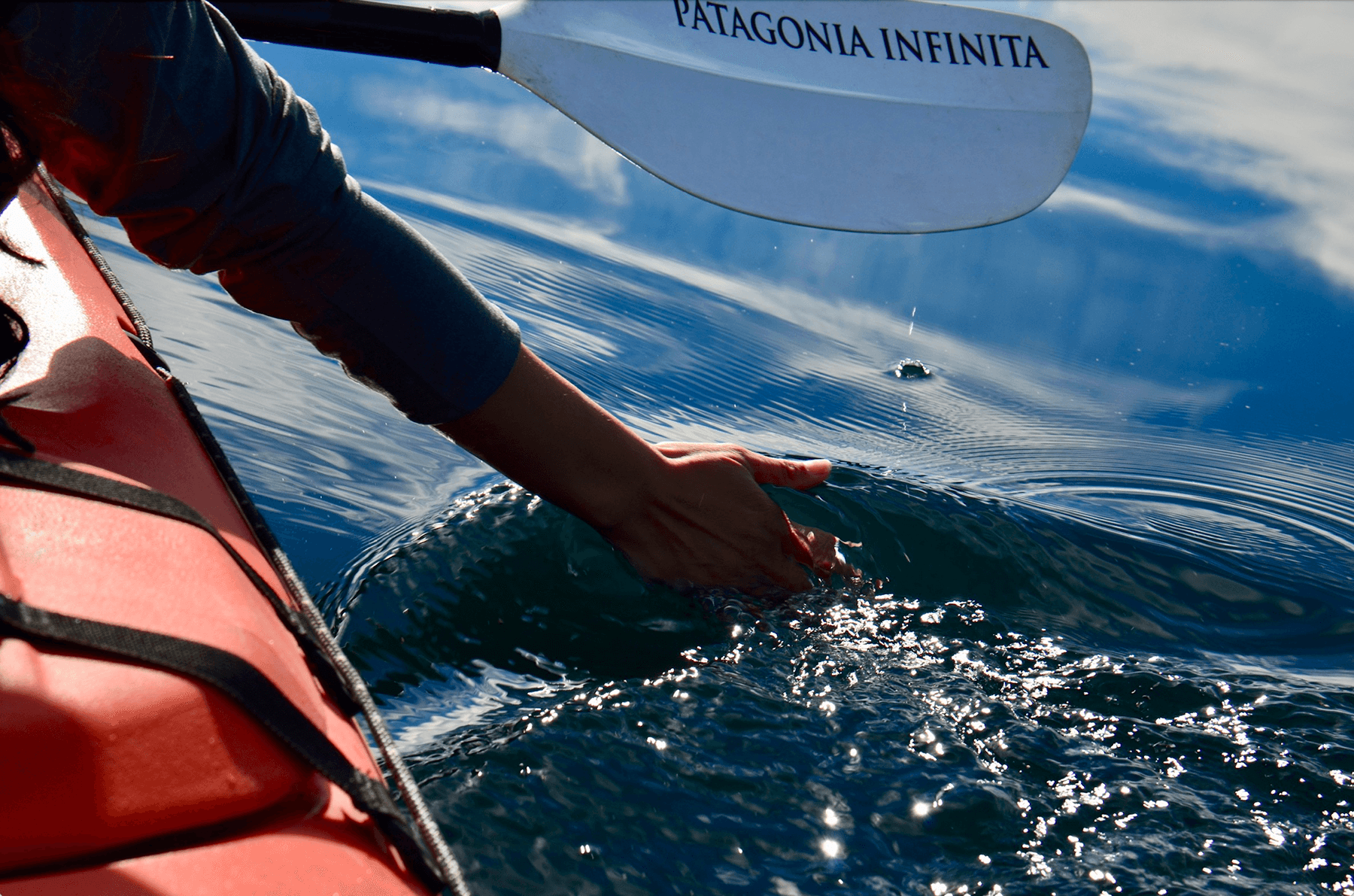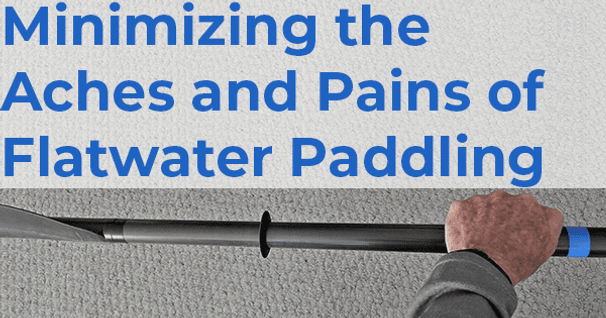The Yoga of Kayaking
As kayakers we have the unique ability to spend a lot of time close to water and observe the qualities and energies of her currents firsthand. The inspiration for this article comes from that intimate proximity to water and the lessons water has taught me throughout my kayaking career. The word 'yoga' means 'union' and there are wonderful life lessons to be learned when we allow ourselves to feel 'united' with the waters that we paddle.
That's why I like to call what I've learned from water 'The Yoga of Kayaking.'
In this article I'd like to share with you some of these important and inspiring life lessons.

Go with the Flow
"Empty your mind, be formless. Shapeless, like water. If you put water into a cup, it becomes the cup. You put water into a bottle and it becomes the bottle. You put it in a teapot it becomes the teapot. Now, water can flow or it can crash. Be water my friend."
- Bruce Lee
Anyone who has kayaked in currents whether they be strong or easy-going has witnessed what Bruce Lee is talking about. When water comes up on a rock it flows around it, when water hits a fallen tree in the river it flows through the branches. Eddies on the river are formed when water flows around an obstacle, such as a rock, and then flows back upstream behind the rock to fill the void that is created by the diversion.
Water accepts what is and continues on its path. When we accept what is happening at this moment in our lives we are better able to go with the flow without creating suffering for ourselves and others. This doesn't mean that you just let life happen to you and become apathetic. On the contrary, when we accept what is we are better able to take right action. The water flowing down a river doesn't resist when it hits the rock. It doesn't complain, feel victimized or react in fear. The water simply changes shape and direction to flow around the obstacle.
We can refer to the same example as paddlers. If we get stuck on a rock while we're kayaking down a river we have some choices. We can resist and react in fear and tell ourselves a story about how we're stuck and can't get unstruck and about how scary it is. Or, we can pause for a moment, accept that we are stuck and calmly lean into the rock and push ourselves off. By staying calm we are better able to respond to the situation instead of reacting out of fear and creating unnecessary suffering for ourselves. We wouldn't just sit there apathetic saying oh well, I guess I'm stuck and I can't do anything about it. We always have a choice to respond out of a sense of acceptance or react out of a sense of resistance. Acceptance allows us to go with the flow like water.
Effortlessness Doing
"Nothing is softer or more flexible than water, yet nothing can resist it" - Lao Tzu
I have a funny story that I feel illustrates this quote. One day I was using a toothbrush to scrub out the shower -- very vigorously - so vigorously that I was getting frustrated that the bits of mold I was scrubbing weren't coming off! I looked and noticed that the bristles of the brush were almost flattened from the force of my scrubbing so they weren't really doing much. At that moment I remembered the teaching of effortless doing and started to scrub more gently and guess what!? The mold came right off without resistance. I had a good laugh at myself - especially since such an inspiring reminder came to me in such a non-inspiring situation.
I always tell my students that the goal of good, strong kayak technique is to look and feel effortless on the water. There should be no power struggle or fight against the water, but instead an effortless dance with the water. When we feel effortless on the water we're actually embodying the powerful gentleness of water that Lao Tzu is talking about.
When I first started to kayak I loved it so much that I wanted to be good immediately. There were days when I would spend hours and hours on the river trying to get better. I would push myself hard and when I wasn't paddling well I'd get frustrated and sometimes end up breaking down. Now that I think back on some of my most frustrating and emotional experiences on the water I realize that I was trying too hard to force things to come to me.
Frustration and unhappiness with our progress in any aspect of our lives is a sign for us to take a step back and remember that gentleness, effortlessness and patience can generate amazing results. We don't have to push and do all the time. What I've come to realize is that sometimes it's not about making it happen as much as it's about doing the work mindfully and then allowing it to all come together - effortlessly.
Compassionate Towards Ourselves and Others
"We are both the wave, individual and unique, and the ocean. Both. At the same time." - Erich Schiffmann
Each drop of water, each river, stream, lake and ocean is part of all the water there ever will be on this planet. They are all unique expressions of the collective that we call water. Just like we are individual, unique human beings that are a part of the bigger collective called the human race. And all of us at our core want the same thing - to feel happy and fulfilled. Being human connects every human to each other and yet we often, too often, forget this connection. This is more apparent when we feel wronged by someone else. It's easy to judge and lay blame than to set our egos aside and feel compassion towards another.
A wise kayaking student of mine recently told me: "Never assume that you know someone else's story." Maybe the woman who was rude to you was having a bad day. Is that an excuse for her to be rude, no, but perhaps receiving some compassion will soften her mood and brighten her day. It may not happen instantaneously, but it will have an effect. One of my favorite quotes attributed to Gandhi is: "An eye for an eye makes the whole world blind, and it takes more strength and faith to be kind."
And remember that compassion is not only reserved for others, but also it's important to practice compassion toward ourselves. Even though each drop of water in the ocean is small, each drop is an important part of the whole. Appreciate your unique contribution to the world!
Pay Attention
"In rivers, the water that you touch is the last of what has passed and the first of that which comes; so with present time." - Leonardo Da Vinci
Paying attention to the present moment has been one of the most transformational practices in my life. The present moment is all we have because the past no longer exists and the future has not yet happened. When we focus our attention on the past and the future we are missing out on the awesomeness unfolding right now.
One of the reasons I love whitewater kayaking so much is that it forces you to focus on the moment. If you don't pay attention in a rapid you could end up somewhere you don't want to be. People are addicted to whitewater kayaking because they feel that intense joy that comes with being really present, in the moment. You don't have to be a whitewater kayaker to experience this. Sea kayakers experience this and lake paddlers who are able to get really quiet and pay attention to the beauty around them are also able to experience the present moment.
A really simple way to tune into the present moment that anyone can do is pay attention to your breath. You can do it right now as you're reading this article. Notice the path of the breath through the body and stay with it for a few breaths. See what happens. I bet you'll feel calm, relaxed and energized! This is the cheapest stress-relief available to you anytime.
I hope you've enjoyed a few of the lessons I've learned along my kayaking way. There are many more… These lessons are not meant to be practiced only once. Just like we enjoy going back to the water to paddle over and over again, these teachings are meant to be referred to over and over until they become second nature. This could take years, just as developing good kayaking technique takes years. Enjoying each part of the journey is important. I remember some really awesome moments from when I was a beginner kayaker - there is joy in every part of the journey.
Anna Levesque is a world-class kayaker who has a passion for inspiring and teaching women. Her experience as an accomplished international competitor, author, instructor and business owner has placed her as the leading expert in her field. Her top accomplishments as a whitewater athlete include a bronze medal at the 2001 World Freestyle Kayak Championships, a spot on the Canadian National Freestyle Team five years in a row, and many top 3 finishes in both Freestyle and Extreme Racing. Anna combines her international expertise in kayaking with her experience as a yoga instructor and student of meditation, to inspire women in confidently creating success and happiness in all aspects of their lives. She offers women's paddling retreats, clinics and trips in Mexico through the her company, Girls at Play, and the Nantahala Outdoor Center. For more information please visit Mind Body Paddle
Related Articles
by Genna Dauphinee of Lendal Paddles Fathers play such a large role in our lives, they support us…
~A Paddler's Post submitted by Gregg Jackson~ Flat water paddling is a great pleasure—a journey into…
During this video we'll do a quick demo of 8 exercises and lay out a basic training plan for you to…
As a professional educator and a kayaking instructor I must begin this article by saying: I believe…



